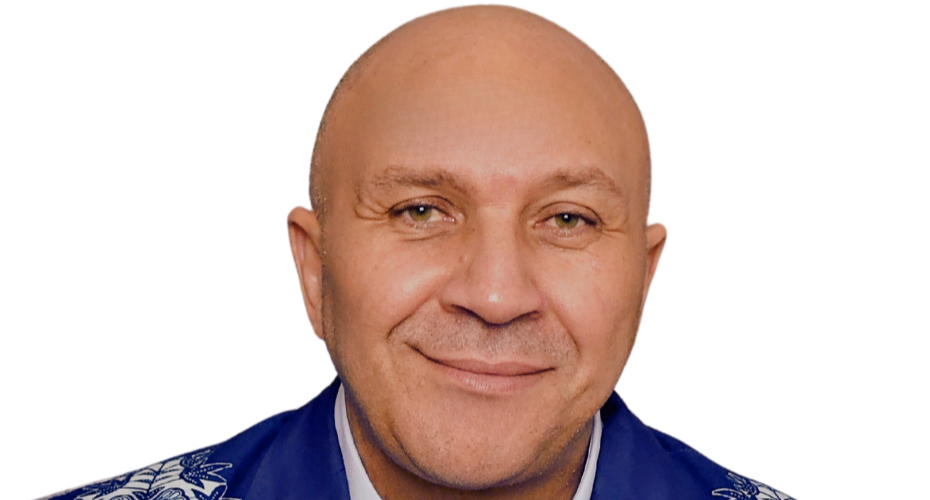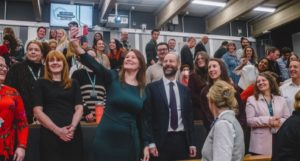Nelson Mandela’s bodyguard set to give inspirational talk at Exeter

Chris Lubbe
Students will this week receive a first-hand account of the leadership of Nelson Mandela during the visit to Exeter of his former bodyguard.
Chris Lubbe was Mandela’s bodyguard for nine years and witnessed how his unique leadership style was so instrumental in South Africa’s peaceful transition from apartheid to a modern democracy.
For the opening talk in the new Leading Edge speaker series, Chris will tell his story about growing up during South Africa’s apartheid regime and share his insights into leadership gleaned from Mandela and Desmond Tutu.
Chris grew up in a Shanty Town in Durban, South Africa, at a time when education was ‘weaponised’ by the apartheid regime, with a university education being free for white students, but not for Black and other racial minorities.
His dream was to become a pilot but despite getting good grades at high school, when he applied for an apprenticeship he was told he didn’t qualify.
“There are probably millions and millions of people in my position whose dreams were short-circuited because of the colour of their skin,” he says.
Understanding that education was his way out of poverty, Chris became a student activist and organised peaceful protests at his high school that were met with violence from the police and army.
Chris recalls students as young as 12 years-old being shot and killed, while he himself became a target for the regime and was detained and imprisoned.
It was later, following Nelson Mandela’s own release from prison, that Chris met the man who would become South Africa’s first Black president.
“It was a total chance meeting,” he recalls. “Of course, Nelson Mandela was quite a tall man, and I’m 6 foot 4. The first question he asked me was, ‘How tall are you?’
“Then he looked at my shoes and asked me, ‘What size shoes do you take?’ And I said size 14. Then he asked me whether I’d like to work as one of his bodyguards, and the rest as they say is history.”
Chris remembers Mandela as not only a charismatic leader, but one who was able to connect and reach out to people whether they agreed with him or not.
“Good leaders are able to work across divides and unite people regardless of political or philosophical differences,” he says.
“Nelson Mandela understood very, very clearly that we can only really get things done when we can work together and so during the transition to democracy, instead getting rid of all the people that worked under the apartheid regime, he actually chose to work with them.”
Chris also praises Nelson Mandela as an incredible listener, saying that whoever came to see him, from Sting to Michael Jackson, always left saying they’d never felt so listened to.
“He believed in the African philosophy of Ubuntu, which says, ‘I am because of you, and you are because of me, and together we are.’”
Chris will be speaking at Exeter as part of the Leading Edge series, where students, apprentices and business professionals hear from inspirational speakers who have led with integrity and challenged the status quo.
He says his talk will not provide his audience with a “three-point plan on how to be a good leader” and that what he tries to do is simply tell his story about growing up during apartheid and share the various lessons from his time working with Mandela.
“Growing up in a shanty town and in an era where there were no libraries or even books for non-whites, I want to get students to understand how fortunate they are and how education can prepare you for the world that we’re living in and not just for a career. That’s a powerful story,” he says.
Chris is visiting schools this month during Black History Month, though says “it’s sad there has to be a Black History Month for people to understand Black history”.
“What I’m hoping to do is to help students understand how integral all of our history is, and how we should value the contribution made by everybody, including people like Martin Luther King, John F. Kennedy, Nelson Mandela, Desmond Tutu and Gandhi. We need to look to all these figures, particularly in the world we’re living in at the moment.
“Winston Churchill once said, ‘The further back you look, the further forward you’ll see.’ When we look back, it’s not about bringing up the past to make people feel guilty, but it’s about understanding how we can move forward together by looking at some of the things that were accomplished. And I think this can change people’s hearts and minds.”
Chris Lubbe will be at the University of Exeter Business School on 16 October as part of the Leading Edge speaker series. Book tickets and find out more about the series here.



